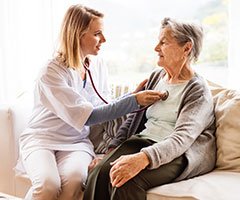Parkinson's Disease and Related Movement Disorders
Parkinson's disease (PD) is now the fastest growing neurological condition in the world. It is a progressive condition, meaning it gets worse over time and affects predominately the dopamine-producing (“dopaminergic”) neurons in a specific area of the brain called substantia nigra. Parkinson’s affects many systems in the body but it is often called a “movement disorder” because of the impaired or involuntary movements it can cause.
At Lee Health, our dedicated team of neurologists, therapists, and support staff work closely with patients to tailor a treatment plan that meets individual needs. We are committed to providing compassionate care and the latest in medical advancements to help manage Parkinson’s disease effectively.
Symptoms of Parkinson's Disease
Parkinson's Disease and related movement disorder signs and symptoms can be different for everyone. For Parkinson's, diagnosis usually occurs after age 55 although early onset at a younger age is possible. Some signs to look for can include:
- Difficulty with balance, posture or gait dysfunction, which may result in falls
- Resting Tremor, most commonly starting in the hands but can also occur in the tongue, jaw and legs
- Stiff or rigid muscles (spasticity)
- Slow movement (bradykinesia)
- Diminished vocal volume & swallowing function
- Constipation
- Depression and anxiety
- Lack of facial expression
- Abnormally small handwriting (micrographia)
Diagnosis and Treatment of Parkinson's Disease
For Parkinson’s, accuracy and efficiency are a top priority when diagnosing movement disorders. It can be difficult to pinpoint a diagnosis among the many different types of movement disorders. Different disorders can have symptoms similar to Parkinson's disease but may require different treatment. A neurologist will make the diagnosis based on your symptom history, neurological examination, and may use imaging tests to rule out other conditions that have similar symptoms.
There is no standard treatment for Parkinson’s disease, it is dependent on the persons' symptoms. Patients need frequent monitoring and adjustments to ensure the long-term effectiveness of their treatments for movement disorders. Treatments can include:
- Medications
- Surgery such as Deep Brain Stimulation
- Rehabilitation Services: Physical Therapy, Occupational Therapy and Speech and Language Pathology
- Mood and Memory Care
- Injections
- Lifestyle Changes
Causes of Parkinson's Disease
The underlying causes of movement disorders and Parkinson's Disease vary by diagnosis and sometimes remain unknown. In people with Parkinson’s, the cells that make dopamine are impaired. As Parkinson’s progresses, more dopamine-producing brain cells die. The brain reaches a point where it stops producing dopamine which causes increasing problems with movement. The biggest risk factor for developing Parkinson's is advancing age.
There is some evidence for the role of genetics, environmental factors, or likely a combination of both.
- Genes: Specific genetic mutations have been identified that can cause Parkinson's disease. However, these are uncommon except in rare cases with many family members affected by Parkinson's disease.
- Environmental triggers: Exposure to certain toxins or environmental factors may increase the risk of later Parkinson's disease, but the risk is relatively small.
-
Lee Health Neurology
One of the country’s most accomplished neurosurgeons has joined LPG’s Neurosurgery program. Dr. George Mandybur is a board certified neurosurgeon specializing in treating Parkinson’s disease, movement disorders, epilepsy and brain and spinal tumors. Learn more about Dr. Mandybur here!
Other Types of Movement Disorders Unrelated to Parkinson's Disease
- Dystonia
- Chorea and Huntington's disease
- Ataxia
- Tremor and essential tremor
- Myoclonus and startle
- Tics and Tourette syndrome
- Restless legs syndrome
- Gait disorders
- Spasticity
- Stiff Person Spectrum Disorder
Other Types of Movement Disorders Unrelated to Parkinson's Disease
- Dystonia
- Chorea and Huntington's disease
- Ataxia
- Tremor and essential tremor
- Myoclonus and startle
- Tics and Tourette syndrome
- Restless legs syndrome
- Gait disorders
- Spasticity
- Stiff Person Spectrum Disorder
What's the Next Step?
Lee Health offers many additional support and care options for individuals and their loved ones impacted by a Parkinson Disease diagnosis. Learn more.
-
Lee Health Parkinson Program
Bringing people together to share experiences, learn from experts, and find the keys to living well with Parkinson’s disease and related movement disorders.
Looking for more information?
-
To join or to learn more please contact the Lee Health Parkinson Program:
Call 239.343.9243 or email Michelle.D.Martin@LeeHealth.org
The Latest Blog Articles
-
Mental Health
5 Brain Boosters to Flex Your Mental Muscle
You can train your brain to remember just as well as you can train for body for a marathon. Steady stimulation will keep you sharp - both mentally and physically.
-
Children's Health
Can Music Help Your Child's Development?
Studies suggest learning some tunes improves wellness – from pain to Alzheimer’s and more
-
Living the Healthy Life Podcasts
Ep. 5: Rewarding Rehab - Programs and Services and Lee Health
Join Lee Health expert Diana Rippl for a discussion about the benefits of rehabilitation, the simple act of breathing, and the Schroth method for scoliosis.







